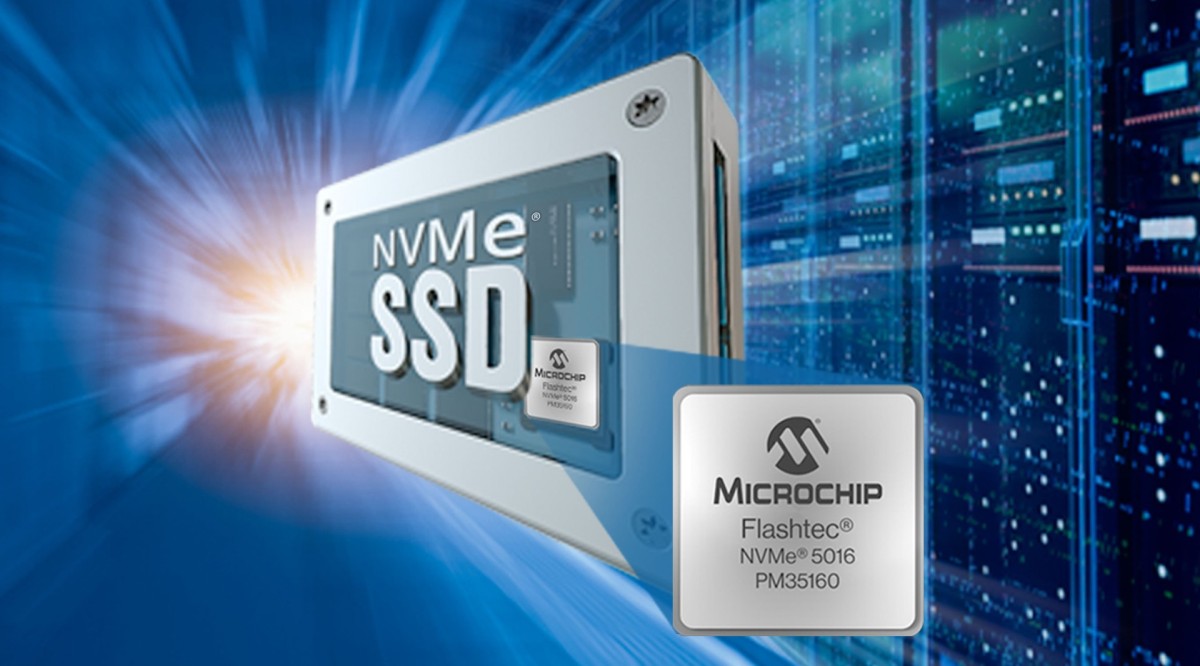The Artificial Intelligence (AI) boom and rapid expansion of cloud-based services are accelerating the need for data centers to be more powerful, efficient and highly reliable. To meet the growing market demands, Microchip Technology has released the Flashtec® NVMe® 5016 Solid State Drive (SSD) controller. The 16-channel, PCIe® Gen 5 NVM Express® (NVMe) controller is designed to offer higher levels of bandwidth, security and flexibility.
“Data center technology must evolve to keep up with the significant advancements occurring in AI and Machine Learning (ML). Our fifth generation Flashtec NVMe controller is designed to lead the market in fulfilling the increased need for high-performance, power-optimized SSDs,” said Pete Hazen, vice president of Microchip’s data center solutions business unit. “The NVMe 5016 Flashtec PCIe controller can be deployed in data centers to facilitate effective and secure cloud computing and business-critical applications.”
The Flashtec NVMe 5016 controller is designed to support enterprise applications such as online transaction processing, financial data processing, database mining and other applications that are sensitive to latency and performance. Additionally, it serves growing AI needs with higher throughput for reading and writing large data sets used in model training and inference processing and provides the high bandwidth necessary to move large volumes of data quickly between storage and compute resources. At sequential read performance of more than 14 GB per second, the NVMe 5016 controller maximizes the usage of valuable compute resources in traditional and AI-accelerated servers under demanding workloads.
In addition to supporting the latest standard NVMe host interface, the NVMe 5016 controller is designed for a high random read performance of 3.5M IOs per second and a power profile focused on power-sensitive data center needs, delivering more than 2.5 GB of data per watt. The NVMe 5016 controller utilizes advanced node technologies and includes power management features like automatic idling of processor cores and autonomous power reduction capabilities. To support the latest Flash memory, including Quad-Level Cell (QLC), Triple-Level Cell (TLC) and Multi-Level Cell (MLC) NAND technologies, the NVMe 5016 controller provides strong Error Correction Code (ECC). All Flash management operations are performed on-chip, consuming negligible host processing and memory resources.
“Microchip’s latest Flashtec PCIe controller, utilizing advanced 6 nm process technology, addresses the power optimization requirements for demanding applications. Its flexible architecture delivers the processing power needed for cutting-edge AI workloads in a compact package,” said Greg Matson, senior vice president of strategic planning and marketing for Solidigm. “The Flashtec PCIe controller’s quality and reliability interop very well with Solidigm’s QLC NAND, ideal for meeting the increasing demand for data-intensive workloads such as AI and ML.”
“Longsys and Microchip have cultivated a strong relationship to drive the rapidly expanding enterprise SSD market,” said Huabo Cai, chairman and CEO of Longsys. “Microchip’s reliable and flexible architecture of the PCIe Flashtec products offers an excellent foundation for Longsys’ enterprise solutions with multiple advanced NAND Flash, delivering efficiency and reliability to standard or customized high-performance enterprise SSDs.”
The NVMe 5016 controller’s flexibility and scalability help reduce the total cost of ownership as advanced virtualization capabilities like single root I/O virtualization (SR-IOV), multiple physical functions and multiple virtual functions per physical function maximize the PCIe resource utilization. The consistent, programmable platform gives developers who plan to utilize Flexible Data Placement (FDP) in their SSDs the control to maximize the performance, efficiency and reliability of Flash resources on the SSD. Coupled with Microchip’s Credit Engine for dynamic allocation of resources, the NVMe 5016 controller enables reliable on-demand cloud services.
“We congratulate Microchip on its latest generation of Flashtec PCIe controllers,” said Maitry Dholakia, vice president of memory products for KIOXIA America, Inc. “The ongoing innovation of ECC in Flashtec controllers, along with their flexible architecture, enables compatibility with our advanced NAND flash products.”
"Congratulations to Microchip on the launch of their new NVMe SSD controllers,” said Dan Loughmiller, director of NAND Product Line Management and Applications Engineering at Micron. “As an industry-leading NAND supplier, our collaboration within the data center storage ecosystem enables customers who want to couple our packaged NAND solutions with their new controllers. We are excited that our work together continues to deliver compatibility with our NAND.”
As the volume of data storage expands, the risk of security threats correspondingly increases, underscoring the imperative for robust and reliable security measures. The Flashtec NVMe 5016 controller is designed to deliver enterprise-level integrity and dependability with comprehensive data protection, uninterrupted operations and safeguarding of confidential information.
Security features have been integrated into the NVMe 5016 controller to help maintain the integrity of both firmware and data throughout its lifecycle—from factory inception to retirement. These features encompass Secure Boot with a hardware Root-of-Trust, dual signature authentication to facilitate system OEM or end-user verification, support for various security standards through diverse authentication algorithms, user data protection with encryption for both data-in-transit (link level) and data-at-rest (media level) and sophisticated key management practices. These practices adhere to stringent security protocols, including the Federal Information Processing Standard (FIPS) 140-3 Level 2 and the Trusted Computing Group (TCG) Opal standards.
In terms of data integrity and reliability, the controller features overlapping end-to-end data protection with NVMe Protection Information (NVMe PI) and single error correction and double error detection (SECDED) ECC, and advanced error correction through Adaptive LDPC. It also includes failover recovery mechanisms utilizing Redundant Array of Independent Disk (RAID) techniques, further fortifying the resilience of the storage system.







